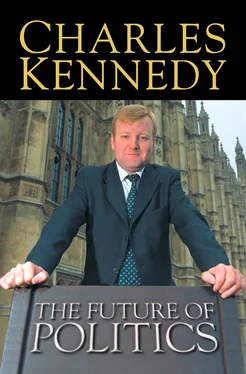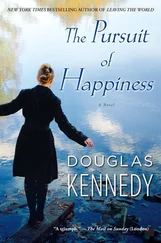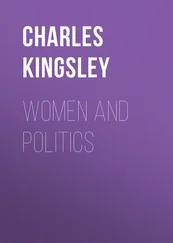1 ...6 7 8 10 11 12 ...18 Politicians, for the most part, are not stupid. They have long been wise to the issue of public disaffection. What has baffled them is the solution. Previously, the tactic of all politicians across Parliament, has simply been to ‘try harder’. Knock on every door, so the logic goes, appear in every newspaper and on every television programme, telling people how important it is for them to get out and vote, and you can make a change.
In this age of all-pervasive media, it is clear that this tactic is not working. It is not because people aren’t aware of the key political issues of the day, or that they are ignorant about who the key politicians are, or what they stand for.
The problem is that we are working the wrong way round. This is the crisis facing politics: people aren’t interested in voting, because they see it as a lip-service to true democracy. Individuals, families, communities, villages, towns and regions still have scant authority, and while so much power is disproportionately centred around a distant government and a single capital, it is no surprise if people are unconvinced that their vote matters. People won’t turn out to vote for a new Prime Minister until they also have a chance to wield real power in their own backyards. Respect for government will only come about once people govern themselves.
And that’s where the solution must lie. The challenge is to build a truly civic Britain, where power has been devolved to the local and regional level, and where we are playing a full role in Europe. Where people no longer expect change to come slowly and inefficiently from Westminster, but have power within their own communities and exercise it themselves. Where the can-do culture tears down the walls built by decades of disillusionment and cynicism. Until politicians stop governing on behalf of the nation and start to govern with it, politics in Britain will remain what it is today – a sheer irrelevance for larger and larger numbers of people – and the consequences for the nation will be disastrous. It will be, in a sense, a final victory for Thatcherism. We will be a nation that prefers to lock the doors, rather than see what’s happening in the street outside.
It may seem inappropriate to speak of Thatcherism ten years after the end of the Iron Lady’s reign, but eighteen years of Tory rule wrought lasting damage upon the fabric of our society, and rather than repair it, Labour has sometimes been too willing to appease the middle classes at the expense of the poor. This is not new in politics – for forty years, J. K. Galbraith has been warning of the political dangers of the affluent disregarding the poor. Without doubt, the current government is a vast improvement on the previous one, but it is dangerous that Labour has not done more to create an environment that is sympathetic to the poor. In political life it means that we face nothing short of an emergency, but to those who already feel disheartened enough to stop reading, I want to point out that crises merely provide us with an opportunity to take action. The remedy is in our hands.
We can only make the most of the future if we are clear about what we want to achieve. My aim in politics is to advance and protect the liberty of the individual, because I believe that this is the only way to achieve true democracy. That, in turn, means ensuring that all people have the maximum life chances and the maximum opportunities to make the most of their natural abilities, whatever their circumstances. How can we speak of ‘democracy’ otherwise? Rule by the people (which is the precise definition of the word) does not mean that small privileged elites exercise their power over the rest. It means that everyone has an equal capacity to exercise power, and equal liberty to govern themselves.
In this book, I shall be using the word ‘liberty’ a great deal, along with its more popular counterpart, ‘freedom’. For me, politics is the machinery by which freedom is made possible. Freedom to breathe, in a safe and clean environment. Freedom from government, by devolving power to the communities, nations and regions of Britain. Freedom to innovate, and to trade with other nations. Freedom to develop one’s talents to the full, and to raise a family in security. None of these freedoms have any validity if the people enjoying them are not also free from poverty. This, and government’s responsibility to bring it about, is my starting point.
Chapter One Dedication DEDICATION Dedication Preface to the Paperback Edition Introduction WHY AREN’T THE VOTERS VOTING? Chapter One FREEDOM FROM POVERTY: THE FORGOTTEN NATION Chapter Two FREEDOM TO BREATHE: THE GREEN FUTURE Chapter Three FREEDOM FROM GOVERNMENT: PEOPLE AND THE STATE Chapter Four FREEDOM TO INNOVATE: SCIENCE AND DEMOCRACY Chapter Five FREEDOM TO GOVERN: THE GREAT DEVOLUTION DEBATE Chapter Six FREEDOM WITHOUT BORDERS: BRITAIN, EUROPE AND THE CHALLENGE OF GLOBALIZATION Conclusion A SENSE OF IDEALISM Notes Index Acknowledgements About the Author Copyright About the Publisher For my parents, Ian and Mary Kennedy Preface to the Paperback Edition Introduction WHY AREN’T THE VOTERS VOTING? Chapter One FREEDOM FROM POVERTY: THE FORGOTTEN NATION Chapter Two FREEDOM TO BREATHE: THE GREEN FUTURE Chapter Three FREEDOM FROM GOVERNMENT: PEOPLE AND THE STATE Chapter Four FREEDOM TO INNOVATE: SCIENCE AND DEMOCRACY Chapter Five FREEDOM TO GOVERN: THE GREAT DEVOLUTION DEBATE Chapter Six FREEDOM WITHOUT BORDERS: BRITAIN, EUROPE AND THE CHALLENGE OF GLOBALIZATION Conclusion A SENSE OF IDEALISM Notes Index Acknowledgements About the Author Copyright About the Publisher
FREEDOM FROM POVERTY: THE FORGOTTEN NATION Dedication DEDICATION Dedication Preface to the Paperback Edition Introduction WHY AREN’T THE VOTERS VOTING? Chapter One FREEDOM FROM POVERTY: THE FORGOTTEN NATION Chapter Two FREEDOM TO BREATHE: THE GREEN FUTURE Chapter Three FREEDOM FROM GOVERNMENT: PEOPLE AND THE STATE Chapter Four FREEDOM TO INNOVATE: SCIENCE AND DEMOCRACY Chapter Five FREEDOM TO GOVERN: THE GREAT DEVOLUTION DEBATE Chapter Six FREEDOM WITHOUT BORDERS: BRITAIN, EUROPE AND THE CHALLENGE OF GLOBALIZATION Conclusion A SENSE OF IDEALISM Notes Index Acknowledgements About the Author Copyright About the Publisher For my parents, Ian and Mary Kennedy Preface to the Paperback Edition Introduction WHY AREN’T THE VOTERS VOTING? Chapter One FREEDOM FROM POVERTY: THE FORGOTTEN NATION Chapter Two FREEDOM TO BREATHE: THE GREEN FUTURE Chapter Three FREEDOM FROM GOVERNMENT: PEOPLE AND THE STATE Chapter Four FREEDOM TO INNOVATE: SCIENCE AND DEMOCRACY Chapter Five FREEDOM TO GOVERN: THE GREAT DEVOLUTION DEBATE Chapter Six FREEDOM WITHOUT BORDERS: BRITAIN, EUROPE AND THE CHALLENGE OF GLOBALIZATION Conclusion A SENSE OF IDEALISM Notes Index Acknowledgements About the Author Copyright About the Publisher
‘True individual freedom cannot exist without economic security and independence. People who are hungry and out of a job are the stuff of which dictatorships are made.’
FRANKLIN D. ROOSEVELT, 1944
In my eighteen years as an MP, I have come to learn that the most effective politicians are those acting out of a very personal sense of injustice. I am often accused of being too rational, too reasonable, of rarely showing temper. This might be the case, but that does not mean I am not motivated by very clear and firmly held convictions, beliefs I have held since I entered the House at the age of twenty-three.
By then, I had witnessed the turmoil of the three-day week and the power cuts, and I was determined that people and government should never again be held to ransom in this way. I had also seen the disparity in incomes between some of the poorer families of my home town and the better-off workers who had migrated from the central belt of Scotland to work in the Corpach pulp and paper mill, which gave me a heightened awareness of inequality and its negative effects.
Читать дальше












